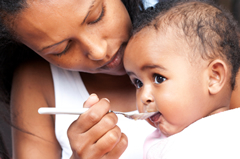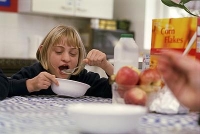The Social Context of Food course


As healthcare practitioners we often feel we know what infants and young children should be eating, but the families we work with can experience barriers in putting this information into practice. In our day-to-day practice, we need to consider the social aspects of food and the effect that our environment has on our food choices.
This session was reviewed by Amanda Avery and updated in February 2017.
Learning Objectives
By the end of this session you will be able to:
- Describe the variability in how families organise eating according to religious, cultural and socio-economic circumstances
- List the external influences on families’ food choices
- Describe the benefits of family mealtimes and parental role modelling
To improve nutritional intakes of families and communities, healthcare practitioners (HCPs) need to help families change their eating habits. To do this, HCPs require an understanding of why and how families make their food choices and engage in particular feeding practices.
Lisa worked as a Paediatric Dietitian for Calderdale and Huddersfield NHS Trust in West Yorkshire for nine years before starting as a freelance Peadiatric Dietitian after moving back to Aberdeenshire in early 2008.
Her special interests are obesity, feeding problems and poor growth.

- Radiology – Integrated Training Initiative (R-IT...
- Posted By eIntegrity Healthcare e-Learning
- Posted Date: 2025-01-10
- Location:Online
- This session reviews which chambers contribute to the ‘normal cardiac outline’ and examines how specific chamber enlargement or absence alters the normal cardiac shape. It will describe the different diagnoses, which result in characteristic
- Radiology – Integrated Training Initiative (R-IT...
- Posted By eIntegrity Healthcare e-Learning
- Posted Date: 2025-01-10
- Location:Online
- This session provides an overview of the clinical manifestations of haemangiomas, lymphatic and vascular malformations, their radiological work-up plus typical imaging findings.
- Radiology – Integrated Training Initiative (R-IT...
- Posted By eIntegrity Healthcare e-Learning
- Posted Date: 2025-01-10
- Location:Online
- This session covers imaging and diagnosis of paediatric mediastinal masses, and is organised based on their location in the mediastinum.
- Radiology – Integrated Training Initiative (R-IT...
- Posted By eIntegrity Healthcare e-Learning
- Posted Date: 2025-01-10
- Location:Online
- This session discusses radiographic anatomy of the normal mediastinum and its compartments containing different structures and why this is useful when interpreting an abnormal image. The silhouette sign and how it is used to localise a mass on chest radio
- Radiology – Integrated Training Initiative (R-IT...
- Posted By eIntegrity Healthcare e-Learning
- Posted Date: 2025-01-10
- Location:Online
- The session looks at pneumothorax, pneumomediastinum, air leaks in neonates, air leaks in older children and post-traumatic air leaks.








